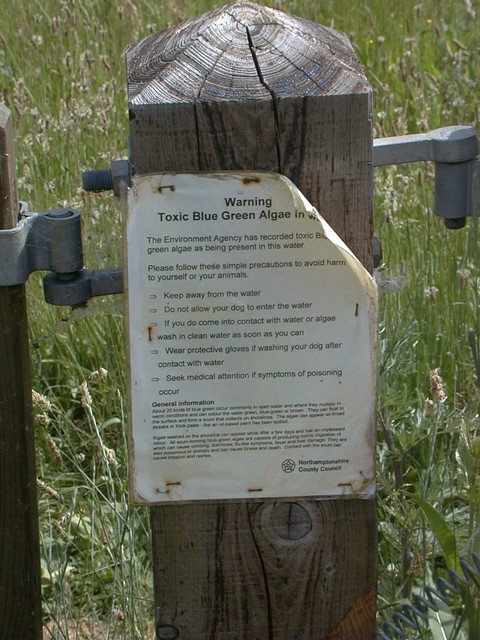What are cyanobacteria?
Cyanobacteria is the scientific name for blue-green algae, or "pond scum." The first recognized species were blue-green in colour, which is how the algae got their name. Species identified since range in colour from olive-green to red.
Cyanobacteria form in shallow, warm, slow-moving or still water. They are made up of cells, which can house poisons called cyanobacterial toxins. A mass of cyanobacteria in a body of water is called a bloom. When this mass rises to the surface of the water, it is known as surface scum or a surface water bloom. Although we don't know the extent to which cyanobacterial blooms occur across Canada, we do know they mostly appear in the hot summer months and are quite prevalent in the prairies.
What are cyanobacterial toxins?
Cyanobacterial toxins are the naturally produced poisons stored in the cells of certain species of cyanobacteria. These toxins fall into various categories. Some are known to attack the liver (hepatotoxins) or the nervous system (neurotoxins); others simply irritate the skin. These toxins are usually released into water when the cells rupture or die.
Added:
23rd Jun 2005
Subjects:
Biology, Geography, Science
Key Stages:
Foundation, Key Stage 1, Key Stage 2, Key Stage 3, Key Stage 4, Key Stage 4+
Keywords:
Blue Green Algae, Summer Leys nature Reserve, poison, toxin, Northamptonshire
Related Links:
EXIF data:| FILE |
| FileName | DSC00018.jpg |
| FileDateTime | 0 |
| FileSize | 265063 |
| FileType | 2 |
| MimeType | image/jpeg |
| SectionsFound | ANY_TAG, IFD0, THUMBNAIL, EXIF, MAKERNOTE |
| COMPUTED |
| html | width="960" height="1280" |
| Height | 1280 |
| Width | 960 |
| IsColor | 1 |
| ByteOrderMotorola | 0 |
| ApertureFNumber | f/6.0 |
| Thumbnail.FileType | 2 |
| Thumbnail.MimeType | image/jpeg |
| IFD0 |
| ImageDescription | |
| Make | NIKON |
| Model | E900 |
| XResolution | 72/1 |
| YResolution | 72/1 |
| ResolutionUnit | 2 |
| Software | v882-71 |
| DateTime | 0000:00:00 00:00:00 |
| YCbCrPositioning | 2 |
| Exif_IFD_Pointer | 202 |
| THUMBNAIL |
| Compression | 6 |
| XResolution | 72/1 |
| YResolution | 72/1 |
| ResolutionUnit | 2 |
| JPEGInterchangeFormat | 786 |
| JPEGInterchangeFormatLength | 3920 |
| EXIF |
| ExposureTime | 1/193 |
| FNumber | 60/10 |
| ExifVersion | 0200 |
| DateTimeOriginal | 0000:00:00 00:00:00 |
| DateTimeDigitized | 0000:00:00 00:00:00 |
| ComponentsConfiguration | ���� |
| CompressedBitsPerPixel | 2/1 |
| ExposureBiasValue | 0/10 |
| MaxApertureValue | 24/10 |
| MeteringMode | 5 |
| Flash | 0 |
| FocalLength | 174/10 |
| MakerNote | Nikon�������������ì�����������������������������������������������ò�������09.41����€�OR���ÿ������u�������;��0V���\��5‰��?
��>��{���������L
ô
� ‚�������á‰��*���à�������������������� |
| FlashPixVersion | 0100 |
| ColorSpace | 65535 |
| ExifImageWidth | 960 |
| ExifImageLength | 1280 |
| FileSource | � |
| MAKERNOTE |
| UndefinedTag:0x0002 | |
| Quality | 5 |
| ColorMode | 1 |
| ImageAdjustment | 0 |
| UndefinedTag:0x0F00 | Array
(
[0] => 262658
[1] => 1
[2] => 3920
[3] => 0
[4] => 72
[5] => 1
[6] => 72
[7] => 1
[8] => -603989761
[9] => 335561472
[10] => 252513807
[11] => 303043090
[12] => 337124884
[13] => 471734037
[14] => 841031196
[15] => 607275328
[16] => 1513958446
[17] => 1078347088
[18] => 1162627911
[19] => 1347775830
[20] => 1836544866
[21] => 1180993637
[22] => -2122153650
[23] => -1919447941
[24] => 2107011936
)
|
 Blue Green Algae warning notice at Summer Leys Nature Reserve, Northants, June 2005
Blue Green Algae warning notice at Summer Leys Nature Reserve, Northants, June 2005





 [ 1 ]
[ 1 ]  [
[
